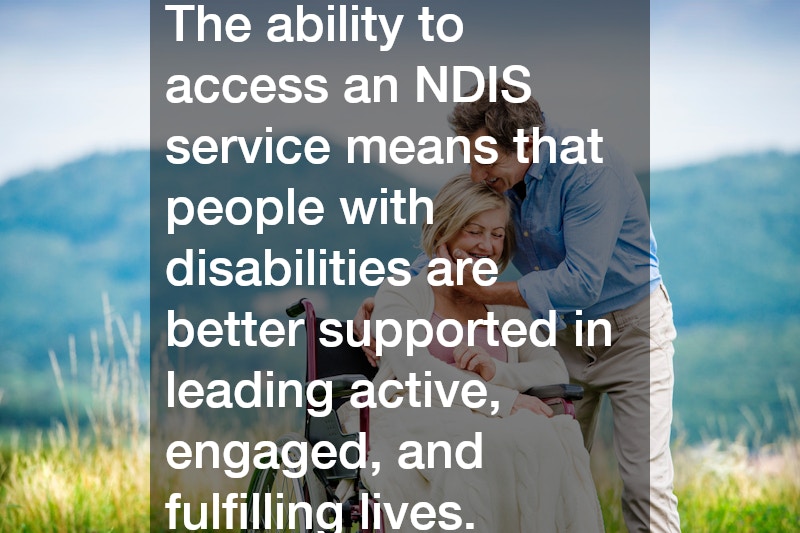The National Disability Insurance Scheme (NDIS) has transformed the way support is provided to Australians living with a permanent and significant disability. Introduced to create more tailored and accessible care, the NDIS operates on a model of individualised funding that empowers participants to make choices that suit their personal goals and circumstances. Whether it’s assistance with daily tasks, access to therapeutic services, or support for employment and education, an NDIS service offers a wide range of benefits that promote independence, community participation, and long-term wellbeing.
Empowering Participants Through Personal Choice
One of the most significant advantages of the NDIS is the level of control it gives to participants. Individuals have the opportunity to set their own goals and choose how they want to achieve them.
Rather than being bound by generic support programs, participants can work with a planner or Local Area Coordinator to develop a customised plan. This individualised approach ensures that support is truly relevant to each person’s unique needs and aspirations.
For example, someone with mobility challenges might use their plan to access physiotherapy and home modifications, while another person with autism may focus on social skills development and communication therapy. With an NDIS service, participants are no longer passive recipients of care. They are active decision-makers, capable of shaping their lives in a way that reflects their values, preferences, and ambitions.
Improved Access to Vital Support Services
Another key benefit of NDIS services is enhanced access to a broad range of essential supports. These may include assistance with transport, personal care, learning and development programs, and even employment services. For many Australians, the NDIS has significantly improved the accessibility and availability of resources that were previously hard to obtain or unaffordable.
In addition to core supports, participants can also access capacity-building supports designed to enhance long-term independence. This can include therapy services such as occupational therapy, speech pathology, and psychological support, as well as education and training opportunities that help participants acquire new skills. By providing funding directly to the individual, the scheme reduces delays and removes many of the bureaucratic hurdles that once stood in the way of essential care.
Promoting Inclusion & Community Participation
The NDIS places a strong emphasis on inclusion and community engagement. It recognises that social connection and community participation play a critical role in a person’s quality of life. Through NDIS services, participants are supported in engaging with local events, recreational activities, and peer networks, helping to build confidence, reduce isolation, and improve mental health outcomes.
This focus on social integration is particularly valuable for children and young adults with disabilities, as it helps lay the foundation for lifelong community involvement. Whether it’s joining a local sports club, attending community art classes, or taking part in group outings, the NDIS ensures that people with disabilities can take part in life just like anyone else. The scheme’s investment in inclusive community services also drives broader social change by fostering more understanding and acceptance of people with disabilities.
Support for Carers & Families
The benefits of the NDIS extend beyond the individual participants. Families and carers also experience improved support and reduced pressure, enabling them to focus on quality time with their loved ones rather than acting as full-time care providers. Access to respite care, counselling, and training means that carers can take a break when needed, learn new skills, and receive emotional support.
Additionally, families are better equipped to understand the system and navigate the care landscape. This leads to more informed decision-making and less stress when advocating for their family member’s needs. With the backing of an NDIS service, families are no longer left to manage everything on their own. They become part of a larger network of support that reinforces the wellbeing of the entire household.
Fostering Long-Term Independence & Employment Opportunities
The NDIS doesn’t just aim to meet immediate needs. Its long-term vision is to promote greater independence, resilience, and participation in the workforce. For many people with disabilities, meaningful employment can offer financial stability, personal fulfilment, and a sense of purpose. NDIS services can help with job readiness training, support in the workplace, and career development pathways.
With tailored employment services available through the scheme, participants can explore a variety of work options suited to their interests and capabilities. This focus on career support helps individuals to become more self-reliant and contributes to the broader economy by opening the door for greater workforce diversity.
A Positive Shift in Disability Support Nationwide
In summary, the NDIS has brought about a fundamental shift in how disability support is delivered in Australia. By placing the individual at the centre of care, the scheme has replaced outdated, one-size-fits-all models with a system that promotes dignity, independence, and choice. The ability to access an NDIS service means that people with disabilities are better supported in leading active, engaged, and fulfilling lives.
Whether it’s through increased personal autonomy, enhanced service accessibility, community inclusion, or long-term employment outcomes, the NDIS represents a more responsive and inclusive approach to care. As the system continues to evolve, its ongoing commitment to empowering individuals and supporting families remains one of its most defining strengths.




